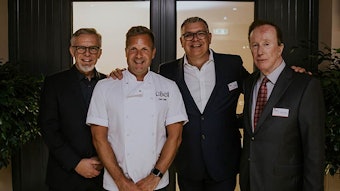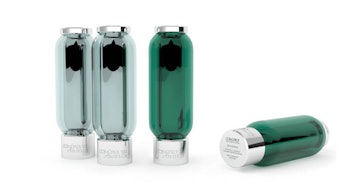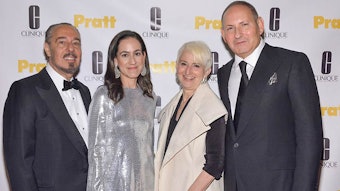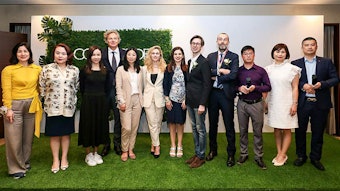"Innovation for Tomorrow's World" was the overarching theme for day three of the IFSCC 2022 London Congress. Research on personalized and planet-friendly product development, the science and technology behind cutting-edge cosmetic ingredients, and advancing consumer safety, among other themes, took to the podiums on day three of IFSCC 2022 London.
Presentations were rounded out with the Innovation in Action Technology Showcase challenge, co-hosted by the Society of Cosmetic Scientists (SCS) and Cosmetic Cluster UK. The congress closed with a celebratory awards gala dinner before industry friends said their farewells until next year's congress—Sept. 4-7, 2022, in Barcelona.
Predictive Personalized Care
Eunbi Ko, of AmorePacific R&I, opened the day describing work toward the development of a predictive algorithm to diagnose individuals' skin conditions. The tool works by collating various skin properties, lifestyle and genetic data, each of which contributes to skin characteristics such as redness, dullness, hydration, oiliness, wrinkles and melanin.
According to Ko, once these factors are understood, personalized solutions can be developed. These may include product recommendations, customized products or even changes in behavior, such as regularly applying sunscreen.
During the Q&A session, one attendee asked how lifestyle data was collected. "We used a questionnaire," she said, "but in the future, we will collect data by a smart device in real time." In addition she noted, "I think we also need to study correlations with psychological resilience."
AI for Planet-friendly Formulating
Masugu Hamaguchi, of Kirin Holdings, presented an artificial intelligence (AI) model to predict the best ingredients to create a foam formulation with excellent makeup removal capacity. He aimed to combine the steps of the consumer using a makeup remover followed by cleansing in order to reduce water consumption.
Input data for the AI was based on prescriptions for formulations including molecular descriptions and their weight fraction, descriptor values for each ingredient, addition rates and more to predict the cleansing capacity of the prescribed formulas. Nonionic surfactants were examined and AI identified eicosaglycerol hexacaprylate (EH) as having the best potential.
Formulations were created and tested, and results showed the AI-predicted cleansing capabilities of given ingredients corresponded with the in-use actual data. "[A] prescription with good cleansing capability was found, contributing to the development of a new cleansing agent that saves time and reduces environmental burden," Hamaguchi concluded.
Pitfalls and Opportunities in Sustainability
Prof. Robert Lochhead, of Robert Lochhead Consulting and the University of Southern Mississippi, raised some eyebrows with his keynote exploring what the industry is doing right in terms of sustainability, and where the pitfalls are. He urged the industry to consider sustainability holistically, considering whether the virtues of a well-intended action may have trade-offs.
According to Lochhead, the three pillars of sustainability are economy, community and the environment. In terms of both community and environment, ingredients with the potential for endocrine disruption were high on his list of concerns. While for many materials, an effective dose and a toxic dose can be identified, the problem with endocrine disruptors, Lochhead explained, is their toxic dose can vary widely, making them difficult to predict.
In terms of environment, Lochhead commended industry efforts. "Our industry has leveraged solar energy, replanted crops and built farms, and used wind farms. These are all good," he said, adding that investing in methane capture and renewable energy such as wind farms has the greatest potential.
In relation, he cautioned companies making efforts to replant trees "Forests have a microbiome, too. So you have to be careful about which trees are replanted. You can kill a forest if you introduce a fungus," he said, recommending that experts be consulted for this approach. He also criticized, "Some companies claim they planted X trees, but they bought the arable land and kicked the local farmers out," reiterating the need to look at sustainability holistically.
Lochhead addressed the "elephant in the room" as well: plastic waste. The main issue is in its management, according to him, but he suggested the industry should view plastic waste as a high value and freely supplied resource rather than waste, noting it would need to be treated and hygienic to be re-used, so the proper facilities and expertise would need to be put into place.
7 Sins of Sustainability and Greenwashing
Finally, Lochhead warned the industry of the "seven sins of greenwashing" to avoid:
- Hidden trade-offs,
- No proof,
- Vagueness,
- 'Worshipping' false labels (implying third party endorsements),
- Irrelevance,
- Lesser of the two evils and
- Unabashed false environmental claims.
Additional talks covered advancing consumer and environmental safety, science and technology behind cutting-edge ingredients, and sustainability, environment and biodiversity; see the full program for additional details.
Plenary Keynote Focus: Climate Change
Closing out three days of scientific presentations and posters, plenary keynote speaker and veteran climate change campaigner, Sir Jonathan Porritt, deliberately avoided an apocalyptic vision of the world in 2030 but asked if "incremental optimization" over the last 20 years of sustainable initiatives had been enough and would continue to be enough. "Clearly not," he said, in view of the "permacrises" arising, such as the recent floods in Pakistan and their impact.
Turning specifically to his observations for the beauty industry, he noted:
1. There is something special about the intimate relationship between beauty products/brands and consumers. Young consumer's expectations will be increasingly important.
2. Everybody, and not just the Chief Sustainability Officer, must become proficient in sustainability values.
3. We must acknowledge and "get real" about the inevitability of climate shocks and their consequences, but it is harder and harder to believe that we can prevent them, when even with only a 1.2°C increase in average temperature per annum over many years, they are still happening.
"The industry has enormous opportunities," he said. "'People will still get it wrong, but now is an opportunity to get on the right side of this story."
Innovation in Action Technology Showcase
As previously reported, in a new initiative for the final day of the congress, the Cosmetics Cluster UK (CCUK) and the Society of Cosmetic Scientists (SCS) co-hosted the Innovation in Action Technology Showcase challenge. Intended for solutions and ideas beyond basic ingredients, participants showed the industry elite their innovations in action, providing UK-based innovators an opportunity to promote their work, suggest options and potentially find future partners for investment.
Following the informal, interactive, hands-on session, delegates visiting the area voted for their favorites. In addition, a secret panel of judges selected one entry as the challenge winner. This year's winner was PBL Technologies, whose mission is to promote commercial development and exploitation of academic research results for public use and benefit. This generates income both to finance its operations and to support the research at the institutes and universities that provide intellectual property to the company.
Celebratory Awards Gala Dinner
Finally, the moment attendees awaited for had arrived—the awards gala and dinner. Polished and primped guests boarded motor coaches to be transported to the Evolution London venue at Battersea park, where they wound along brightly lit paths to arrive at a terrace, where a one-man band and living "statues" entertained guests as festivity preparations were finalized. Once inside, guests found their seats, following which performers from the British television dance contest, Strictly Come Dancing, entertained attendees amidst dinner courses, awards and recognitions.
Judi Beerling, IFSCC 2022 London Congress Steering Committee Chair, kicked off the evening, welcoming guests and introducing the performers. Eva Ramos IFSCC (2021-2022) president, thanked all the organizers for their efforts, the Praesidium and the benefactors for their support. She wished incoming IFSCC president (2022-2023) Tony Gough good luck. Gough also welcomed attendees and presented Ramos with a certificate of appreciation. He additionally presented Beerling with a token of appreciation and named her as a Fellow.
Sam Farmer, SCS UK president, welcomed attendees, alongside IFSCC education chair Frederic Leroy, following which the awards were presented. The 2022 Henry Maso Award honoring scientists under the age of 40 who had published work in the IFSCC magazine within the past two years went to Maxine Lègues, of CTIBiotech. His paper was entitled, "The World's First 3D Bioprinted Immune Skin Model Suitable for Screening Drugs and Ingredients for Normal and Inflamed Skin." In addition, an honorary mention was made of Megumi Kaji, of POLA, for her paper, "Do-it-Yourself Cosmetics: The Pleasure of Creating Your Own Emulsions."
Next, for the IFSCC congress awards, the top ten posters presented at the show were recognized and one winner was named: Paul Lawrence, of Biocogent, for his poster, "Targeting Small Non-coding RNAs to Diminish the Epigenetic Ravages of Aged Skin." This year's Applied Research Award went to Christopher Berkey, of Stanford University, for his presentation, "Exploiting Ingredient Interactions to Deliver Optimal Performance of Skin Care Formulations." Finally, the Basic Research Award went to Elias Abou Samra, of L'Oréal, for his paper, "Decoding Epidermis Reconstruction Through Time-course Multi-omics Data."
The evening closed with a live band performing hits across decades. They inspired the vast majority of guests to get up on the dance floor, proving once again that serious scientists who work hard can also play hard.










